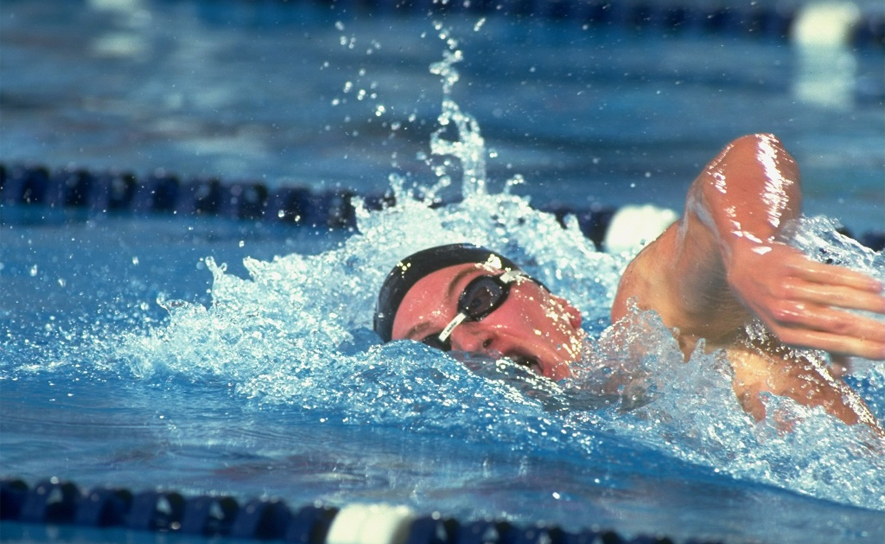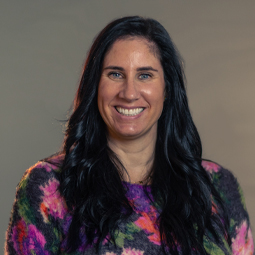USA Swimming News
PRIDE Month Trailblazer: Keith Frostad

As any Olympian would tell you, sacrifices are necessary to reach dreams of representing the United States of America. Missing out on school dances, passing on Friday night football games and pausing friendships to accomplish these dreams are common instances, but for Lawrence “Keith” Frostad, a 1992 Olympic swimmer in the 1,500-meter freestyle, overcoming bullying as an openly gay man created obstacles only a select few have had to face.
“Making the Olympic team is obviously an amazing experience,” Frostad recalled. “Getting to that point was not so easy. I had to go through a lot of external pressure that a lot of other swimmers did not have to go through…but obviously being gay in the 90’s - in Texas - was not the easiest.”
Frostad was raised by a single mother who worked two to three jobs at a time to help make his dream of making the Olympic Team a reality. He attributes his mother and his friends as his primary support system growing up and throughout his collegiate swimming career.
As Frostad entered college, the bullying reached its peak. Due to the mistreatment by the men’s team, he practiced with the women’s team. Frostad recalls every day was like an obstacle course passing the men’s team to get into the pool. Some of the bullying included having kickboards and pull buoys thrown at him, catcalls, whistles and name-calling.
“It wasn’t the entire men’s team, but there were three or four who just let me have it every single day. Leading up to that process of making the Olympic Team was difficult, but once making it, obviously, you say to yourself, ‘All this pain and torture they put you through is worth it.’”
Earlier this year on a podcast, Frostad recalled an instance in 1991 where he was in the locker room getting ready for the 400-meter freestyle. A group of men nearby were talking about who was favored to win, and his name was mentioned. The group went on to call Frostad names for his sexual orientation. Upon hearing the hurtful words, Frostad remembers the swimmers nearby looking at him for a reaction. He simply pretended he didn’t hear and got ready for his race. Frostad ultimately won the event that night at finals.
It is important to speak up when you witness bullying. As USA Swimming continues to work towards a culture free from bullying, Frostad agrees a lot of progress has been made.
“After the [podcast] interview came out someone reached out to me. I didn’t remember this person, so I asked who they were. This person said he heard my interview and that he heard my example of being bullied in the locker room. He said he was in the locker room that day and was one of the guys talking about me. He said, ‘It never felt right, even then, and I wanted to apologize.’”
Frostad asked why he was apologizing all these years later. The man responded, “Because someone very close to me is gay, and I don’t want him treated the same way you were treated.”
“I thanked him and told him, ‘The fact that you are apologizing now shows that you know right from wrong, and that you yourself are making a difference by apologizing,’” Frostad said.
Frostad has received other apologies since the podcast came out. He believes the culture has made a huge shift from how he was treated in the 1990’s to today, but there is always room to grow.
“I didn’t have that much power back then, but now I do, and I can assure you I am using my voice,” Frostad stated. “I don’t want people to go through what I went through, and I wasn’t alone. There were a couple other swimmers who were out – Ian Mull. He gave me the courage to come out. I told him this: ‘It’s people like you who opened the door for me. If it wasn’t for you, I wouldn’t have done it.’ He really opened the door for all of us.”
In 2016, Frostad came back to his roots in the pool to coach distance swimmers on a local team. At a meet in Thousand Oaks, California, two coaches came up to him and introduced themselves. As the conversation evolved, the coaches shared they both had age group swimmers who had come out on their respective clubs and how they continue to support them.
“That is so wonderful, and this is why I want to tell my story,” Frostad said. “I understand there are politics and not everyone agrees on everything, but still, human rights should not be a political act. It should be something we should respect. We are still human beings, and we deserve to be treated with respect.”
As Frostad reflects on his time as a competitive athlete, he notes some major changes within our sport.
“I know that when I came back to coaching in 2016, they had a couple swimmers on the team that were gay. Everyone knew and no one had a problem with that. I thought to myself, ‘Wow, things have really changed.”
The growth and betterment of USA Swimming relies heavily on our membership. Frostad believes there are some things coaches, team leaders and other athletes can do to be strong allies.
“Knowledge for sure, education for sure,” he said. “A lot of the time, people are afraid of what they don’t know or don’t understand. If people have someone or know someone who is gay, they tend to be more understanding of it. Like the guy who apologized that was in the locker room. Someone he is close to is gay and he does not want what happened to me to happen to him. So, he is taking a stand, he himself has changed. He himself is making a difference in this world for that person he loves. And I think education and knowledge is key.”
Frostad also suggests having a speaker come and talk about their experiences, to give tips on ways to improve communication after someone comes out or how to respond if you hear derogatory language.
“I know we have Safe Sport, and I think that is really important to continue with PRIDE courses,” Frostad urged. “You are obviously going to have someone who is gay on your team, it doesn’t mean that it is wrong or right. It means you need to learn about how to deal with it in the right way…you will know how to handle it.”
When on the pool deck, Frostad believes positive reinforcement and inclusion is key. Ensuring an accepting environment of everyone’s differences can facilitate this type of inclusion.
“It is ok to be different, that is great,” Frostad stated. “What makes the world so wonderful is that everyone is so different. We should be celebrating diversity, celebrating people’s views, regardless of what they are because we are all so different….The country would be really bland and boring if we all thought the same.”
Having resources and respect for other individuals is also important, especially if someone is thinking of coming out. He remembers telling athletes they need to come out when they are ready.
“Don’t let anyone else tell you what to do, this is your life, and you need to be ok with coming out.”
For those who want to be an ally, providing a listening ear and a safe space is important.
“You don’t need to give advice, just listen,” he said. “Safe space is another great resource. Safe space for me back then was the women’s team. They loved me and protected me. They loved me regardless. It is ok for people to have different views, as long as there is a safe space.”
Swimming teaches us all so much more than being competitive. From Frostad’s point of view, it involves dedication, commitment, responsibility and time management. He remembers learning a lot about teamwork and team building from being an athlete.
As we continue to develop great people in swimming, not just great athletes, it is important to continue pushing the boundaries of accepting all our members. Resources are available on USA Swimming’s Diversity, Equity and Inclusion website, and all members are responsible for providing a positive atmosphere for our athletes.
“I’m going to be 100% honest. I didn’t tell my story or experiences for almost 30 years,” Frostad disclosed. “And for the first time in 30 years I feel free. I actually feel free. I don’t have this on my back anymore, and I’m glad I got it out…All I know is it’s my story and I’m glad I finally got my story out and I’m not alone. There are others out there who are like me. And it’s ok to be you, it’s ok to be yourself. And that’s the story I want to say.”
Learn more about the LGBTQ+ community by reading tips on how to be an ally here.
To report bullying, please visit USA Swimming’s reporting page at www.usaswimming.org/safe-sport/report-a-concern.

